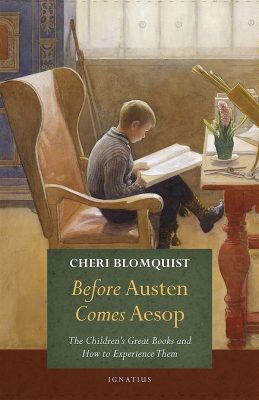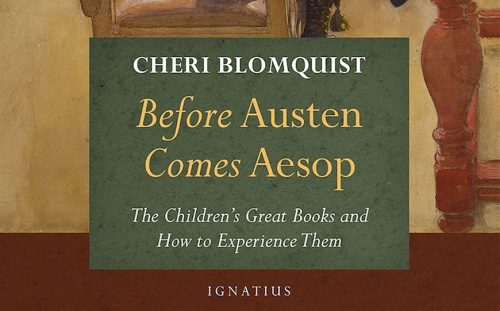By Loretta Pehanich | Catholic News Service
“Before Austen Comes Aesop: The Children’s Great Books and How to Experience Them” by Cheri Blomquist. Ignatius Press (San Francisco, 2021). 272 pages, $17.95.
I approached Cheri Blomquist’s book, “Before Austen Comes Aesop: The Children’s Great Books and How to Experience Them,” from my perspective as a mother of four and grandmother of 10 wanting to learn more about encouraging children to love books.
While Blomquist’s book did not meet this goal for me, it contained 100 pages of book summaries arranged by time period, which could be useful for those looking for book ideas.
“Before Austen…” takes an academic approach and includes eight appendixes with curriculum suggestions. However, the author limits her selections to children’s books from an American and English perspective. When the sum of human knowledge is accessible on a cellphone, such a focus is not broad enough for today’s children who are natives in a technology age.
The author left unanswered many of the subjective questions she posed in the introduction. For example, “What kind of childhood reading helps facilitate a rich literary experience in adulthood?” and “Why do we rush students past juvenile classics to adult classics before they might be ready for them?”

Most importantly, she leaves out any contributions from Eastern civilizations, favoring a classical approach centered on Greek, Roman and European stories. Our cultural foundations are now so broad that we do a disservice by focusing only on “Western great books,” as the author calls them.
I consulted an educator who holds a master’s degree in teaching and who is a mother of four for her opinion on this book. She agreed that it falls short for those wanting to provide foundational reading material for children, and she concurred that it could be useful for certain home-schooling parents we know.
I would have liked to see more newer books recommended, and material written by people of color, stories of multicultural families and books addressing some of the moral dilemmas children today encounter. The author’s point of view was limited. I wish she paid better attention to positive statements about diversity.
The author admits that fond memories influence our book recommendations. I remember many trips where our kids selected whatever books their interests sparked. I loved the quiet that ensued for hours after. The author supports the notion of encouraging children to read material without limiting them to reading levels. So do I.
At the same time, I disagree that children should avoid adult classics. When a child is challenged to read material that might be deemed too mature for them, it provides opportunities to open conversations on some very important topics that will affect their futures.
One of the most useful features of the book for me was its short book synopses with the author’s judgments of each’s virtues and themes. These will be useful for parents who struggle to interest their children in reading.
I wished the book had an index of all books reviewed by title and author. Instead, the appendixes offer classics by era, study-method cheat sheets and ways to help grade literature assignments.
As I watch my grandchildren read “Super Rabbit Boy” books (stories based on video games) and “Star Wars” graphic novels, I doubt their interest would be as captivated by the author’s important classics “indicated by literary history.” Yes, children will learn from “Anne of Avonlea,” but are there better ways to teach the same things than to prioritize stories written before the mass production of cars?
“This list is not a collection of recommendations,” the author notes, but rather a list of books with “accepted status as the best of the best.” As she defines “literary quality” I’m reminded of what my husband and I often joke when we dislike a movie: “Well, it was critically acclaimed.”
Pehanich, a Catholic freelance writer, blogger and spiritual director, writes from Kirkland, Washington.






















